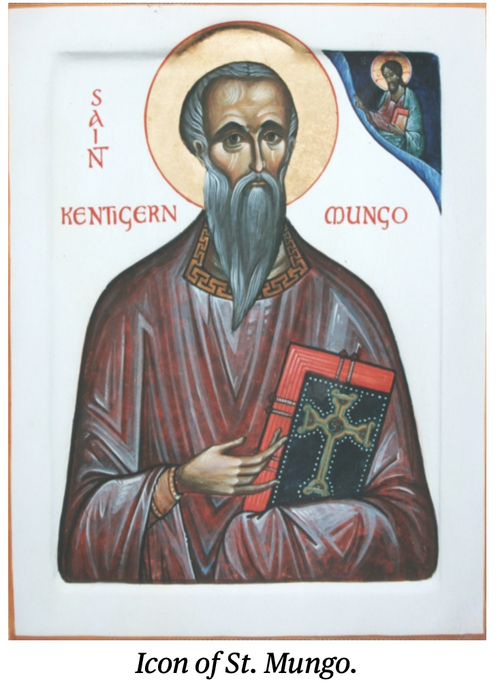

Daily Primer — August, 8 - Glasgow — Scotland
Each day you will be given:
A Florilegium entry
A Daily Prayer
and a Night Prayer.
A Florilegium entry
A Daily Prayer
and a Night Prayer.

The Journey Within
The outer journey is only part of the pilgrimage. There is an inner landscape which lies often unnoticed and unexplored by us. These months leading up to our travel-pilgrimage are a time when we are are meant to be navigating the hills and valleys of our inner life before God. This is done by disciplined prayer and also by beginning to take notice of our inner disposition, noticing how the external events affect our internal life.
It would be hard to over-estimate the value of daily journaling in helping us to explore the journey within. Practices like the Examen, or writing an Ignatian dialogue with God, can do much to uncover how the Spirit is at work in our preparation for the travel pilgrimage.
Other disciplines which help us as we prepare in the months prior to departure on a travel-pilgrimage might, as Christine Valters Paintner suggests, be borrowed from the monastic tradition. She urges the following: understanding the impulse to “go” as a “calling;” cultivating an inner-hospitality which welcomes and hosts all of the new and mysterious things we are discovering about ourselves as we journey; a proper humility which acknowledges that for all of our careful planning, we do not really know what will happen on our trip; a commitment to simplicity which is about letting go of things we do not need to (or want to) carry with us; an understanding that our goal is to find the center of our life as we take a journey to the edges of things.
The outer journey is only part of the pilgrimage. There is an inner landscape which lies often unnoticed and unexplored by us. These months leading up to our travel-pilgrimage are a time when we are are meant to be navigating the hills and valleys of our inner life before God. This is done by disciplined prayer and also by beginning to take notice of our inner disposition, noticing how the external events affect our internal life.
It would be hard to over-estimate the value of daily journaling in helping us to explore the journey within. Practices like the Examen, or writing an Ignatian dialogue with God, can do much to uncover how the Spirit is at work in our preparation for the travel pilgrimage.
Other disciplines which help us as we prepare in the months prior to departure on a travel-pilgrimage might, as Christine Valters Paintner suggests, be borrowed from the monastic tradition. She urges the following: understanding the impulse to “go” as a “calling;” cultivating an inner-hospitality which welcomes and hosts all of the new and mysterious things we are discovering about ourselves as we journey; a proper humility which acknowledges that for all of our careful planning, we do not really know what will happen on our trip; a commitment to simplicity which is about letting go of things we do not need to (or want to) carry with us; an understanding that our goal is to find the center of our life as we take a journey to the edges of things.
The Soul of a Pilgrim: eight practices for the journey within, pp.18-ff. Christine Valters Paintner.
Florilegium is the Medieval Latin word for bouquet, or more literally flowers (flos, flor-) which are gathered (legere). The word florilegium was used to refer to a compilation of writings, often religious or philosophical. These florilegium are literary flowers—beautiful words/prayers/thoughts I have gathered. During my sabbatical they will give me something to ponder each day. — PHL.

Be Thou, triune God, in the midst of us as we give thanks for those who have gone from the sight of earthly eyes. They, in Thy nearer presence, still worship with us in the mystery of the one family in heaven and on earth.
We remember those whom Thou didst call to high office, as the world counts high. They bore the agony of great decisions and laboured to fashion the Ark of the Covenant nearer to Thy design.
We remember those who, little recognized in the sight of men, bore the heat and burden of the unrecorded day. They served serene because they knew Thou hadst made them priests and kings, and now shine as the stars forever.
If it be Thy holy will, tell them how we love them, and how we miss them, and how we long for the day when we shall meet with them again.
God of all comfort, we lift into Thine immediate care those recently bereaved, who sometimes in the night time cry “would God it were morning”, and in the morning cry “would God it were night.” Bereft of their dear ones, too often they are bereft also of the familiar scenes where happiness once reigned.
Lift from their eyes the too distant vision of the resurrection at the last day. Alert them to hear the voice of Jesus saying “I AM Resurrection and I AM Life”: that they may believe this.
Strengthen them to go on in loving service of all Thy children. Thus shall they have communion with Thee and, in Thee, with their beloved. Thus shall they come to know, in themselves, that there is no death and that only a veil divides, thin as gossamer.
We remember those whom Thou didst call to high office, as the world counts high. They bore the agony of great decisions and laboured to fashion the Ark of the Covenant nearer to Thy design.
We remember those who, little recognized in the sight of men, bore the heat and burden of the unrecorded day. They served serene because they knew Thou hadst made them priests and kings, and now shine as the stars forever.
If it be Thy holy will, tell them how we love them, and how we miss them, and how we long for the day when we shall meet with them again.
God of all comfort, we lift into Thine immediate care those recently bereaved, who sometimes in the night time cry “would God it were morning”, and in the morning cry “would God it were night.” Bereft of their dear ones, too often they are bereft also of the familiar scenes where happiness once reigned.
Lift from their eyes the too distant vision of the resurrection at the last day. Alert them to hear the voice of Jesus saying “I AM Resurrection and I AM Life”: that they may believe this.
Strengthen them to go on in loving service of all Thy children. Thus shall they have communion with Thee and, in Thee, with their beloved. Thus shall they come to know, in themselves, that there is no death and that only a veil divides, thin as gossamer.
Rev. George F. MacLeod, published in The Whole Earth Shall Cry Glory.

You, Lord, are the one who sees; who takes note of the grief and trouble brought by wickedness. You have been our helper, our strong defender since our youth. As we enter into the dark hours we give thanks that, like Christ in his dark hour, we can commit into your hands ourselves and all whom we love. You, Lord, hear the desires of the meek. You incline your ear as we commend to your care the ones we love. So rise up and meet our prayer with acts of justice and with intimations of your mercy. In the name of the Father, and of the Son, and of the Holy Spirit. Amen.
Psalms 10:14, 31:5. Service of Compline. Liturgy of the Hours — PHL.
St. Mungo

